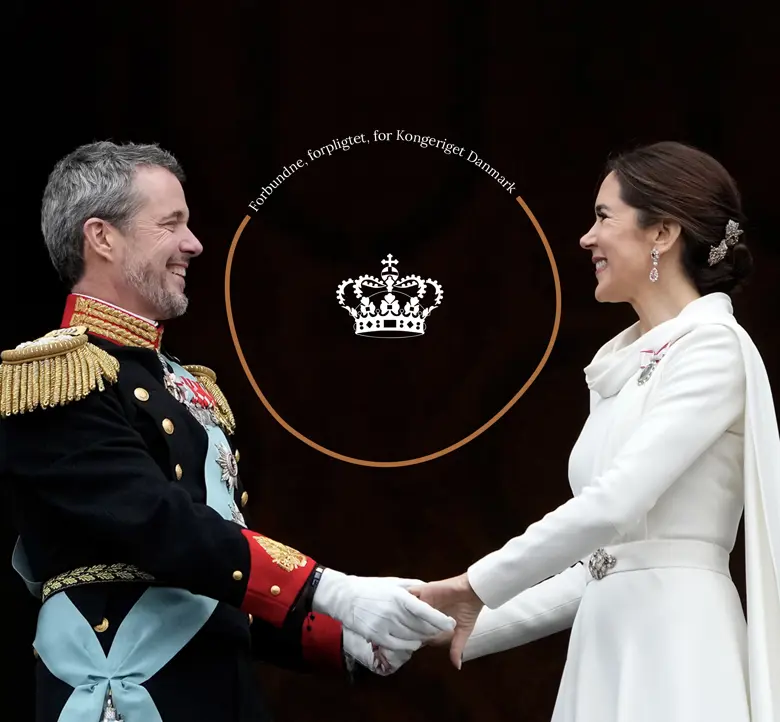

Frederik André Henrik Christian, His Majesty The King, Count of Monpezat, King of Denmark since 14 January 2024. HM The King was born on 26 May 1968 as the son of HM Queen Margrethe II and Prince Henrik of Denmark (d. 2018).
Family
Christening and confirmation
The King was christened in Holmens Kirke (the naval church) in Copenhagen on 24 June 1968 and was confirmed in Fredensborg Palace Chapel on 28 May 1981.
Wedding
On 14 May 2004, The King married Miss Mary Elizabeth Donaldson, who in connection with the marriage became HRH Crown Princess Mary Elizabeth of Denmark. The wedding ceremony took place in Copenhagen Cathedral, and the wedding festivities were held at Fredensborg Palace.
Children
HRH Crown Prince Christian Valdemar Henri Jean, born on 15 October 2005, HRH Princess Isabella Henrietta Ingrid Margrethe, born on 21 April 2007, HRH Prince Vincent Frederik Minik Alexander and HRH Princess Josephine Sophia Ivalo Mathilda, twins born on 8 January 2011.
Residence
The Royal Family resides both in Frederik VIII’s Palace at Amalienborg and in the Chancellery House at Fredensborg Palace.
Education
Education
The King attended Krebs' Skole during the years 1974-1981, from 1974-1976 as a private pupil at Amalienborg and at Krebs' Skole from the third grade. In the period 1982-1983, The King was a boarder at École des Roches in Normandy, France.
In 1986, The King graduated from the upper secondary school of Øregaard Gymnasium, and in 1995, His Majesty graduated from the University of Aarhus with a MSc (political science). In connection with these studies, The King studied political science at Harvard University, USA from 1992 to 1993.
Business background
The King served at the Danish UN Mission in New York in 1994 and was posted to the Royal Danish Embassy in Paris as First Secretary of Embassy from October 1998 to October 1999.
Military background
The King has been educated primarily within the defence, where His Majesty has completed several basic and active educational courses.
The King’s military education began in 1986 in the Queen’s Life Guard Regiment. In 1988, His Majesty was appointed as a lieutenant of the reserve. After obtaining that rank, The King became a platoon commander in the Royal Danish Hussar Guard Regiment in 1988. In 1989, The King was appointed as a first lieutenant of the reserve.
The King completed frogman training with the Royal Danish Navy Frogman Corps in 1995. The same year, The King was appointed as a first lieutenant of the reserve (navy), and in 1997 His Majesty was appointed as a lieutenant commander of the reserve (navy) and as a captain of the reserve (army).
In 2000 - after training at The Flight School - His Majesty was appointed as a captain of the reserve (air force).
Between 2001 and 2002, The King completed further training step II for leaders at the Royal Danish Defence College, and in 2002, The King was appointed as a major (army and air force) as well as a commander (navy). In 2002 and 2003, The King served as a staff officer at Defence Command Denmark, and His Majesty also became a senior lecturer with the Institute of Strategy at the Royal Danish Defence College in 2003.
In April 2004, The King was appointed as a commander, senior grade in the navy, lieutenant colonel in the army and lieutenant colonel in the air force.
In 2010, The King was appointed as a commander in the navy and colonel in the army and the air force.
On the occasion of the succession of the throne, The King has been appointed to the highest military rank in the Army, the Navy and the Air Force respectively. As admiral and general, His Majesty is now of the same rank as the Chief of Defence.
Participation in expeditions
In 1986, The King participated in an expedition to Mongolia with a focus on nomads, and in 2000, The King participated in "Expedition Sirius 2000", which was a four-month and 2,795 km dog-sled expedition in the northern part of Greenland.
Language
The King’s mother tongue is Danish. In addition, His Majesty speaks French, English and German.
Head of State
Politics
As Head of State, The King takes no part in politics and does not express any political opinions. The King acts loyally at all times to the government in power.
Role and duties as Head of State
Denmark has a constitutional monarchy, which means that the monarch cannot independently perform political acts. For example this means that although The King signs all Acts of Parliament, these only come into force when they have been countersigned by a Cabinet Minister. The King’s participation is thus a necessary but not sufficient precondition for the law’s validity.
As Head of State, The King participates in the formation of a new government. After consultation with representatives of the political parties, the party leader who has the support of the largest number of seats in the Folketing (the Danish Parliament) is invited to form a government. Once it has been formed, the monarch will formally appoint it. Similarly, it is also The King who formally dismisses ministers.
Additionally, The King is the formal Head of the Government and therefore presides over the State Council, where the Acts that have been passed by the Folketing are signed into law.
The Prime Minister and the Minister of Foreign Affairs report regularly to The King to inform him of the domestic and foreign political situation.
The King hosts official visits by foreign heads of state and pays state visits abroad. The King also receives all foreign ambassadors, who – before they can commence performing duties as an ambassador here in the country – must present their so-called credentials from the head of state of the country they represent to The King.
Other fundamental duties
In his work, The King must represent Denmark abroad and, at the same time, be a focal point at home. The King fulfills the latter function by, among other ways, being present and speaking at a number of events and arrangements across the country each year. For example, that can involve openings of exhibitions, institutions, etc., anniversaries and birthdays, and celebrations of special national or local days. The annual New Year’s Address is another example of how The King fulfills his role as a national focal point.

Patronages and honorary memberships
The Royal House of Denmark's work in reviewing honorary duties, honorary titles, etc. is not yet completed.
- American-Scandinavian Foundation
- The Danish Bible Society
- Bloddonorerne Danmark
- Copenhagen Climate Ministerial
- Danish Architecture Center
- Danish Design Center
- Danish Church Abroad/Danish Seamen’s Church
- DenmarkBridge
- The Greenlandic House
- Det Kgl. Vajsenhus
- The Royal Danish Geographical Society
- The Royal Danish Academy of Sciences and Letters
- DGI
- The NORDEN Association
- Foreningen til lærlinges uddannelse
- Katuaq – Greenland Cultural Centre
- Kolturplanen on the Faroe Islands
- Copenhagen Royal Chapel Choir
- Léonie Sonning Music Prize
- North Atlantic House
- Save the Children Denmark
- The Danish Red Cross
- State of Green
- Naval Officers Association
- The Anglo-Danish Society
- The Brain Prize
Royal Run
When The King turned 50 in 2018, the birthday was marked with, among other things, the running event Royal Run.
Royal Run is arranged by The Sports Confederation of Denmark, DGI and the Danish Athletic Federation.











